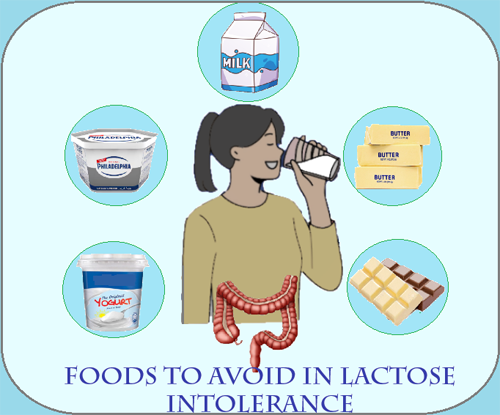Lactose and Lactose Intolerance
Lactose is the natural sugar found in milk and dairy products. It is a carbohydrate made of two simple sugars—glucose and galactose—broken down in the body by an enzyme called lactase. When the body doesn’t produce enough lactase, lactose cannot be digested properly, leading to a condition called lactose intolerance.

Unlike milk protein allergy, which is an immune system reaction to proteins in milk such as casein or whey, lactose intolerance is a digestive problem that results from an enzyme deficiency and does not involve the immune system.
What are the symptoms of lactose intolerance?
Common symptoms include bloating, gas, diarrhea, stomach cramps, and headaches. These may feel worse if you also have conditions like irritable bowel syndrome (IBS), visceral hypersensitivity, or small intestinal bacterial overgrowth (SIBO).
Here is a list of common foods and snacks that often contain a lot of milk or dairy:
1 Dairy & Beverages
-
Whole milk and flavored milk drinks
-
Milkshakes and smoothies made with dairy
-
Hot chocolate made with milk
-
Milk-based coffee drinks (e.g., lattes, cappuccinos)
2 Frozen Desserts
3 Soups
- Cream-based soups (e.g., chowders, cream of mushroom)
4 Main Dishes & Fast Food
5 Confectionery & Sweets
-
Milk chocolate and white chocolate
-
Custards, puddings, and flans
-
Cheesecakes
-
Cream-filled pastries, milk bread, and donuts
6 Dressings & Condiments
Managing Lactose Intolerance
-
✅ Read labels carefully, as lactose can appear in processed foods like soups, salad dressings, and snacks.
-
✅ Lactase supplements can help break down lactose when taken before eating dairy.
-
✅ Probiotics and prebiotics may improve tolerance by encouraging bacteria that convert lactose into lactic acid instead of gas.
Some people can tolerate small amounts—about 12 g of lactose (1 cup of milk or a scoop of ice cream). However, everyone’s tolerance is different — experiment to find what works best for you.
Try lactose-reduced or lactose-free dairy products, or alternatives
Medical Disclaimer :
This information is for educational purposes only and should not be used as a substitute for professional medical advice.
If you suspect you have lactose intolerance or are experiencing digestive discomfort after consuming dairy, consult a qualified healthcare provider for proper diagnosis and guidance. A doctor or dietitian can help determine your tolerance level, identify safe foods, and suggest appropriate treatments or dietary adjustments.
Read further on:
≺≺ What food is most effective for moderating blood sugar?
≺≺ How Do Sugary Meals and Beverages Harm Dental Health?
≺≺ How are artificial sweeteners made?
≺≺ What health problems are linked to consuming corn syrup?
≺≺ What Is the Ketogenic Diet? Is the Keto Diet Right for Everyone?
≺≺ What is the Okinawan diet? What is the secret behind Okinawan long life expectancy?
≺≺ EWG’s- The Clean Fifteen: Fruits and Vegetables with the Lowest Pesticide Levels.
≺≺ What are antioxidants? How antioxidants in the fruits and vegetables help in preventing cancers and diseases?
≺≺ What foods should people with high blood pressure avoid?
≺≺ How can I reduce the risk of cancer-causing chemicals when cooking or grilling meat?
≺≺ What happens to my blood vessels when I gain weight?
≺≺ What type of exercise is best for lowering my blood sugar?
≺≺ What impact can sitting for long periods have on my health?
≺≺ How toxic are the nitrites used in curing processed meats?
≺≺ What foods can lower prostate cancer risk?
≻≻ Watch this page for more such informative articles on Health, Nutrition, and Wellness.
≻≻-Back to Home page.
Further reading (External Links opens in new window):
≺≺- Cleveland Clinic – Self-Care Guide for Living With Lactose Intolerance.
≺≺- Harvard Health Publishing – Lactose Intolerance – Harvard Health.

